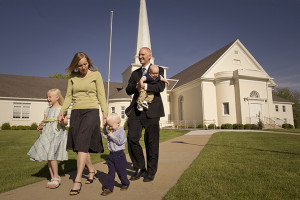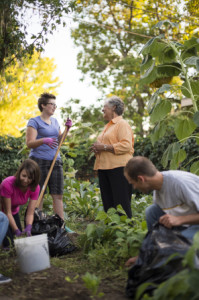This article grew from a conversation I had recently with a gentleman who was struggling with tolerance, but appears to be completely unaware that he has no tolerance. Instead of seeing his own intolerance for others, all he sees is others intolerance for him. That got me thinking.
How Tolerance Works
Basically, tolerance is supposed to be the ability to allow for alternatives in one’s life. I may put the toilet paper roll on with the paper coming over the top. If I am tolerant, I don’t freak out when you put the roll on with the paper coming out the bottom of the roll. I allow for differences.
 Tolerance is a good thing. It allows us to get along with each other and still be friends. It allows for preferences in the way we do things and the way we perceive the world. This type of tolerance allows people to be of varying levels of quality or sophistication in all areas of life without judgment or condemnation. This type of tolerance allows people of varying cultures and economic backgrounds to still be friends and get along with each other.
Tolerance is a good thing. It allows us to get along with each other and still be friends. It allows for preferences in the way we do things and the way we perceive the world. This type of tolerance allows people to be of varying levels of quality or sophistication in all areas of life without judgment or condemnation. This type of tolerance allows people of varying cultures and economic backgrounds to still be friends and get along with each other.
Tolerance allows people of different backgrounds to love freely with an open heart, despite apparent flaws. What you were raised with as normal – the toilet paper roll coming off under the roll, may appear to me as a flaw in your upbringing, just as my desire to have the roll come off over the top may appear as a flaw in my upbringing to you. Hopefully we will both laugh off the difference and move on.
Tolerance at Church
 Sometimes laughing off individual differences isn’t so easy when it comes to how we serve in the Church. There are times when a leader is insensitive to the needs or requests of those they lead. There are times when someone following the leader finds it difficult because they don’t believe the leader is worthy of their respect, for whatever reason. There are a million and one ways and reasons for hurting each other’s feelings or having our feelings and feathers ruffled as we serve alongside each other in the Lord’s Church.
Sometimes laughing off individual differences isn’t so easy when it comes to how we serve in the Church. There are times when a leader is insensitive to the needs or requests of those they lead. There are times when someone following the leader finds it difficult because they don’t believe the leader is worthy of their respect, for whatever reason. There are a million and one ways and reasons for hurting each other’s feelings or having our feelings and feathers ruffled as we serve alongside each other in the Lord’s Church.
This is the problem my new friend has run into. He is accustomed to strict levels of performance from his business background. He has great difficulty with the concept that lay leaders in the Church are not held strictly accountable to earthly tribunals if they do not follow every rule and live up to every standard as he feels they ought to do.
In his talk entitled, “Teach Us Tolerance and Love,” Russell M. Nelson of the Quorum of the Twelve Apostles said:
Our Creator decreed “that there should be no contention one with another, but that they should look forward with one eye, having one faith and one baptism, having their hearts knit together in unity and in love one towards another.”
Intolerance seeds contention; tolerance supersedes contention. Tolerance is the key that opens the door to mutual understanding and love.
As I thought about the difficulty my new friend is having in his Church callings, which are all ending in disaster because of his lack of tolerance, I thought to myself, “How can you teach someone to be tolerant of others?” Then I thought, “Can you even teach tolerance?” The response came into my head, “If it can be learned, it can be taught.”
Learning Tolerance
After some thought, and a long discussion with my wife, I settled on six ways tolerance can be taught. If you can think of additional ways to teach tolerance, I would love to hear from you in the comments below. I’m sure there are more than what my wife and I were able to come up with.
- Recognize God’s patience. We need to pray to recognize how patient God is with us. If anyone sees our shortcomings and our inconsistencies, it is our Father in Heaven. We need to learn a sense of His longsuffering and patience with us. Only then can we truly extend that same courtesy to others. There is something about comprehending our own sense of indebtedness to God that puts us in a frame of mind to be more Christlike in our tolerance for the weaknesses of others.
- Stop judging. If I can catch myself making judgments about someone else I will have a better chance of finding ways to change my thinking habits. Each time I catch myself being critical of someone else it gives me the opportunity to see if there isn’t some way for me to be supportive of that person instead of being critical.
Learning to support and encourage, instead of criticize and condemn, is a humbling experience. Tolerance is not something possessed by the proud. Tolerance is possessed by the humble and meek, those who have a sense of their own frail humanity.
- Practice gratitude. Becoming a grateful person is not easy. It is ever so much easier to expect blessings to flow to us just because we are so wonderful. Be that as it may, we will never feel gratitude until we have learned how dependent we truly are on the goodness and mercy of God. Once we begin to feel the blessings of the Lord’s grace we will be given a bigger heart, one that can turn outward.
 Once we begin to see God’s love in those around us we will find it much easier to let little annoyances go in favor of finding ways to offer support instead of condemnation for a job less than perfectly done.
Once we begin to see God’s love in those around us we will find it much easier to let little annoyances go in favor of finding ways to offer support instead of condemnation for a job less than perfectly done.
It is important to note here that all of these blessings we seek at the hands of the Lord are gifts from God. Our capacity to love and serve, forgive and bless others is given to us and increased within us as an act of kindness and grace from God. The good news is that we can seek out and ask for these blessings, and the Lord will gladly grant them. He wants us to experience the happiness that comes with having these virtues.
- Give service. Service, given naturally and with love, creates greater tolerance. Service naturally produces love for others. It also produces a broader scope of how we see people. The more we serve, the more we begin to realize that people in all stages of development are precious in the sight of God. It is difficult to harshly criticize or thoughtlessly condemn someone we see as precious in God’s sight.
- Motivation is important. We are all aware of the “purity” of our personal motivation for the things we do, but how often do we give serious consideration to the motivation of those we are criticizing and condemning?
When I view someone else’s action from my vantage point only, I may not be able to see a justifiable rationale for that action. But what if I was able to comprehend the rationale from that person’s point of view. Suddenly I can see why things happened the way they did. That doesn’t necessarily make what happened correct, but it gives me a wider perspective and the possibility of being able to love the person, despite the behavior.
The Lord always loves the sinner, though despising the sin. Elder Nelson, in the same talk referenced earlier said this about the risks of having “boundless tolerance”:
Now may I offer an important note of caution. An erroneous assumption could be made that if a little of something is good, a lot must be better. Not so! Overdoses of needed medication can be toxic. Boundless mercy could oppose justice. So tolerance, without limit, could lead to spineless permissiveness.
The Lord drew boundary lines to define acceptable limits of tolerance. Danger rises when those divine limits are disobeyed. Just as parents teach little children not to run and play in the street, the Savior taught us that we need not tolerate evil. “Jesus went into the temple of God, and … and overthrew the tables of the moneychangers.” Though He loved the sinner, the Lord said that He “cannot look upon sin with the least degree of allowance.” His Apostle Paul specified some of those sins in a letter to the Galatians. The list included “adultery, fornication, uncleanness, lasciviousness,
“Idolatry, witchcraft, hatred, … wrath, strife, seditions, heresies,
“Envyings, murders, drunkenness, revellings, and such like.”
To Paul’s list I might add the regrettable attitudes of bigotry, hypocrisy, and prejudice.
 As we serve beside our fellow saints, I hope we will not be guilty of prejudice or hypocrisy. We need to be more forgiving of each other’s imperfections, without accepting those imperfections and embracing them. We too must learn to hate the sin, but always love the sinner, for we fall into that category of sinner as well.
As we serve beside our fellow saints, I hope we will not be guilty of prejudice or hypocrisy. We need to be more forgiving of each other’s imperfections, without accepting those imperfections and embracing them. We too must learn to hate the sin, but always love the sinner, for we fall into that category of sinner as well.
- There is more than one way. In learning to be tolerant of others it is important that we come to recognize that there is more than one way to skin a cat, more than one way to scale a mountain, and more than one way to run an organization.
Yes, there are some required wordings for ordinances in the Church. There are very few things that have to be done with precision or it is not acceptable. But how we deal with each other, how we accomplish tasks, how we run an organization, is wide open for interpretation. As long as what we do falls within the guidelines of the official Church handbooks, almost anything can happen.
People have different leadership styles, based either on their previous training or their lack of training. They have different opinions of how to “keep” commandments. We interact with each other based on our economic position in life, our social connections, our culture, our educational level, etc., etc., etc.
Our great goal is to become a Zion people. A people of one heart and one mind. That doesn’t mean we will all do things exactly the same and for the same reasons. It means that we will see the bigger picture, the higher law, and will learn to live with the little differences that make us all human. We will learn to tolerate those little differences, and come to understand when something is a little difference, and when it is a matter of importance.
All of this requires a constant seeking of the Spirit. It is the Spirit who will teach us, guide us, and help us be forgiving, understanding, and loving toward our fellow Saints. We learn all virtues as gifts from God, and tolerance is no different. It can be learned, and it can be taught. But we need to seek out the Lord so He can teach us how to be more tolerant. The rewards are great, but we must first be willing to do the work to be taught this precious virtue.
About Kelly P. Merrill
Kelly Merrill is semi retired and writes for https://gospelstudy.us. He lives with his wife in Idaho. His strength is being able to take difficult to understand subjects and break them down into understandable parts. He delights in writing about the gospel of Christ. Writing about the gospel is his personal missionary work to the members of the Church and to those of other faiths who are wanting to know more about Christ's gospel and His Church.




Excellent article, Kelly! I think it is also important to understand we are a Church of volunteers. We all come to callings with different skill sets. The Lord doesn’t look at a resume when He calls people. We are not always called for what we can offer, but for what we can learn.
Yes I just realized that we are called that we may learn . With this in mind, I can learn to be more tolerant.
Great observation Tudie. If we had to be qualified for every calling, most of us wouldn’t ever make it out of nursery. We wouldn’t be qualified to handle the children!